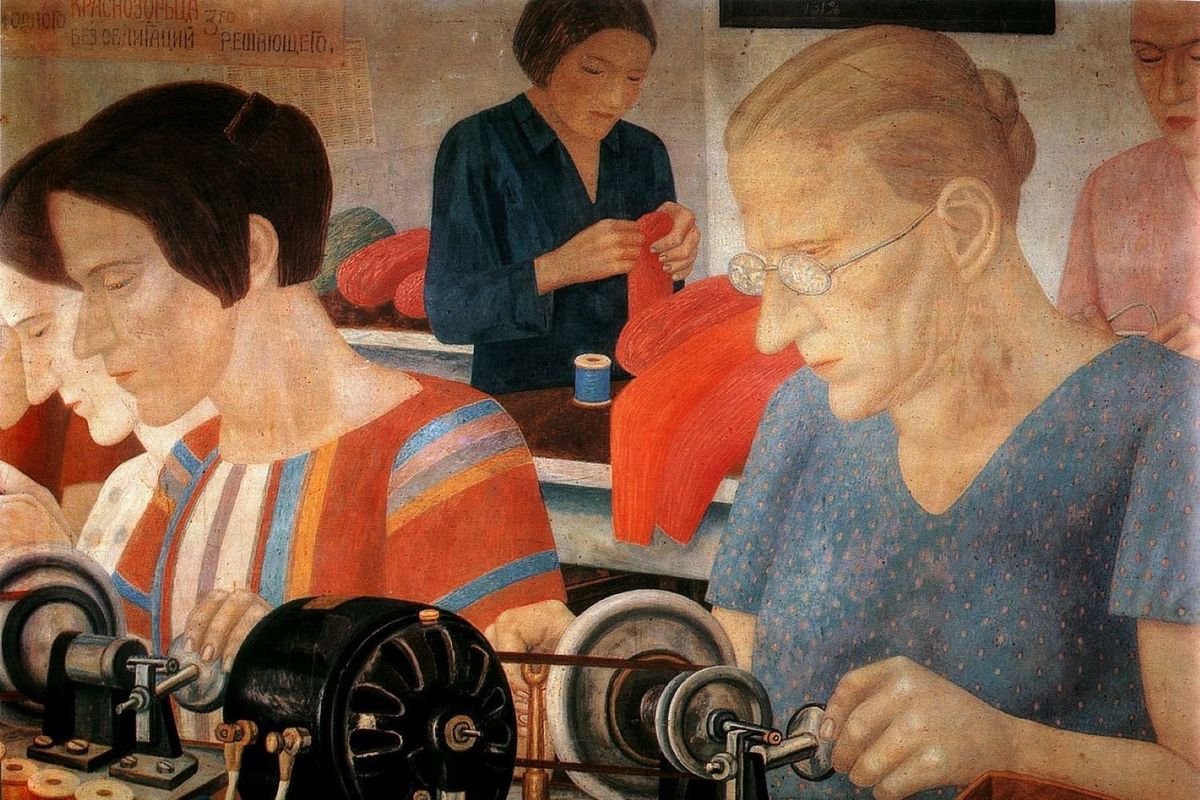Life, for the vast majority of humans, is not very glamorous. It involves doing a lot of boring and tedious things like paying taxes (have you collected all your documents?), cooking dinner, and sweeping the floor. And yet, these everyday tasks (which constitute the majority of our lives) seem to vex Millennials; this generation has suffered from widespread ridicule for laziness and for the inability to grow up. But, somewhat paradoxically, Millennials also seem exhausted.
They suddenly lapse in their responsibilities at work or home and drift away from relationships (sometimes called “ghosting”). They are frustrated at being unable to obtain the same level of material wealth enjoyed by their parents. The pandemic has only heightened this problem, it seems. Those unemployed seem hopelessly so, while the still employed are typically over-employed, and with most interactions going digital, ghosting is easier than ever for both.
The term that has been used to describe this (particularly Millennial) problem of the still-employed is “workism,” which refers to the unspoken modern belief that the more work we can do the better we are (we like to compete with others for how tired we are, for example), and to the tendency to completely identify ourselves with our work. There have also been many attempts to describe the prevalent feeling of burnout among Millennials and young working professionals.
Ann Helen Peterson’s viral buzzfeed article “How Millennials Became the Burnout Generation,” tries to explain why Millennials are struggling both with those everyday tasks and also with their work life more generally speaking. For example, she puts forward the idea that Millennials basically work all the time, and, that when they are not working, they are busy trying to excel in other ways: drinking enough water, going to the gym or running a marathon, eating at trendy restaurants and then sharing all these experiences on social media for the perfect Instagram life.
Peterson essentially argues that Millennials have bought into the lie that if we optimize our lives we can have it all and look good doing it. An activity like doing the laundry does not really factor into this equation, and when a task cannot be easily optimized, Millennials struggle to complete it. In short, we at some level believe there is a method for “winning” at life which largely sidesteps the boring things.
A podcast from the Ezra Klein Show with Peterson and also Derek Thomson (who wrote an article on “workism” for The Atlantic) reiterates some of the same ideas: Millennials can never truly leave their work due to modern technology, work and leisure bleed together in such a way that everything basically feels like work, and Millennials feel guilty when they are not working (or “optimizing”), and so on. Near the end of the podcast, however, the discussion takes a surprising turn—towards religion. Thomson, a self-described secular Jew, says that he had never really thought seriously about belief in God prior to writing the article about workism.
The respondents agree that part of the obsession with “winning at life” has to do with getting feedback about your life from other people, since our constant social media presence allows us to get external validation about our everyday activities. In other words, we are searching for a measure by which to live the good life. Thomson goes on to comment that when you are religious you do not require this social feedback loop. You do not need a public performance of your life to make it valuable, because your life is measured by a transcendent principle. Thomson et al. were coming to see that there is no solid narrative or evaluative principle for life without religion, no matter how much we try to build our “story” on Facebook.
However, while reading these various articles and listening to the podcast, I came to the realization that these commentators were missing the fundamental point about why Millennials are obsessed with work (and with treating their extracurricular lives like work). As capitalism has become the religion of most Americans, so the measure of the worth of our lives has become our “product.” My life has become a brand. That is why Millennials can both seem obsessed with work, and yet not value hard work at all. Our modern society does not treasure the hardworking McDonalds employee, and has moved decidedly away from a culture where one person works the same job for 30 years. In fact, we often despise and look down on those who do the consistent, menial jobs that make our society function (think retail and agriculture).
We want a fun, flashy job at a tech startup where we have a pinball machine in the foyer. The reason for this desire is that we do not care about actual work, what we care about is the product of that work. We care about what we can quantify and what we can export on social media, which, for a retail employee holding down two jobs, is precious little. Many Millennials are in fact hardworking, but we are burning out because we are not trained to think of that work as valuable or meaningful in and of itself. We also struggle to perform in earnest the kinds of daily duties and entry-level jobs that society seems to value so little. This issue of work then becomes one of human dignity, because our worth as a human being is constantly being measured by our output (we can also see the negative effects of this kind of mentality on our respect for the poor and the elderly).
In the Christian tradition, however, the exact opposite is true. The Christian life, as it is summed up by St. Benedict, is the life of work and prayer, which is a life with virtually no concern for market value. The value of this life comes from the act of work, from the process of working out one’s own salvation, as Paul would put it (see: Phil 2:12). It is also definitely not an optimized life. The desert fathers and monastics of ages past specifically chose to do work involving manual labor, to do menial or simple tasks in order to support themselves and their communities.
Their products were, for the most part, exactly the basic necessities of life that we tend to value the least in our modern work culture. Their tasks were often time consuming and tedious (for example, rope-making or basket-weaving). They also spent as much time as possible in prayer. From an outside perspective, prayer is a massive waste of time. You do not get a paycheck from prayer, and it is hard to get a good Instagram shot while sitting in adoration. Prayer is generally speaking pretty boring, and the payoff is usually invisible to everyone except the supplicant. You cannot optimize prayer and you cannot master prayer, any more than you could optimize or master marriage.
Moreover, as the lives of the saints teach us, even the holiest people often remain relatively unknown until after their death. They do not produce something which is readily consumed, and they often do not profit in this life from the labor of their vocation. Think of St. Thérèse of Lisieux—many of her contemporaries thought she was, at best, a nice little nun or, at worst, the spoiled baby sister of the Martin family—not the saint that her inner life proved her to be. Likewise, the most recent Terrence Malick film about Bl. Franz Jägerstätter is titled “A Hidden Life,” referencing the end of George Eliot’s Middlemarch, which makes a similar observation about the hiddenness of the majority of human goodness.
Malick chose this title presumably, in part, because Jägerstätter’s heroic act of virtue in suffering the death penalty because he refused to serve in the German military in WWII was unheard of outside of his own hometown until relatively recently (His life was first written about in 1964, and he was beatified in 2007). Saints also often die uncertain of their own legacy and sanctity, like St. Augustine, who prayed the penitential Psalms up until his last dying breath as the Roman empire fell apart (see: the end of the Life of St. Augustine by his friend Possidius). In our Christian tradition, we do indeed value work, even when it does not lead to impressive, visible, or tangible results. Holiness does not depend on its marketability.
This widespread Millennial burnout, therefore, seems to me to be naturally related to a recent uptick in vocations to the religious life, specifically among women. Eve Fairbanks has reported on this striking increase for the Huffington Post. She describes how, after 50 years of decline, more and more women are entering the process of discernment to become a Catholic nun. A 2017 survey, she notes, shows that 13% of Catholic women between 18-35 said they had at least considered becoming a Catholic sister. If even a small number of those women become nuns, she writes, the legions of those once in religious life would be repopulated.
Fairbanks, however, struggles to explain these numbers. Being a nun is extremely counter-cultural in our current social and political climate. Fairbanks seems to settle on predicting a veer towards conservatism brought on by the general malaise of modern life. She tends to see young women choosing the convent because they want someone to control and guide them in a postmodern world. She also sees that these young women regard Jesus as the perfect spouse because he loves them as they are (her way of couching it, however, sometimes makes it seem as if these women are searching for a kind of fantasy boyfriend).
There is some truth to her observations, even if her way of expressing them is not particularly supportive of the religious life, generally speaking. But the comments of the women she interviewed spoke directly to the kinds of concerns raised by “workism” articles. Young women feel burned out of trying to be perfect before they even graduate high school (where they strived to get good grades and to maximize their extracurriculars). The article describes achievement as a burden, and also echoes the human need for validation which is not being satisfied by social media.
What these women find in the monastic life is that God does not measure their worth by the same calculus as the world does. Abandoning the measure of the world, which has become increasingly exacting in lockstep with our optimization of labor and profit, is becoming particularly attractive to Millennials. Perhaps we are living in time when we will see a renaissance of the religious life. It was born, after all, at a time when Christians were not in the majority, and when the measures of success were also vastly different than those of the Gospel. But, in any case, increasing the visibility of those in religious life can perhaps help to heal our vision and cure us of the false notion that we can conquer life with the right method and enough hours at the office. Those who have given up everything can help us see that we do not need a successful career or photo-worthy food or even a family to be a child of God and a valuable human being.
Finally, then, the solution to the problem of burnout is not working less or learning how to do leisure better or perfecting the art of “self-care” (which just becomes another thing to burn out from trying to master). These things are important, especially in our technology-saturated world, but they are finally insufficient because we cannot make our own lives meaningful, even if we “live our best life”—a phrase that has become almost ubiquitous on social media. We will always burn out of a life without meaning.
Christ, on the other hand, tells us to live our worst life, to take up our cross and to follow him, to embrace suffering as a means of unity with him. Christ tells us not to win, but to lose, because he who loves his life will lose it, but he who loses it for Christ’s sake will find it (see: John 12:25, Matt 16:25, Luke 9:24). In other words, we must admit that in this life there is no “best life” other than Christ’s life. By Christ’s human life, he transfigures our fairly awful, pretty boring, mostly tedious human lives into something which by grace gains us a share in the life of God. Living our lives with this frame of reference does not make it easy. It is certainly possible (yes, even highly likely) to experience exhaustion or overwork as a Christian. But, when we unite the whole of our messy lives to Christ, when we work for his sake while there is still light, we become something more than our earthly work.
Reflecting on these words of Christ and on their reception in the Christian tradition, we can see why Christians of ages past embraced a completely different attitude towards the purpose of their life, which was not to treat living as if it were a skill to be acquired. Rather, monastics, like the ancient philosophers, saw life as preparation for death. Nothing could be further from our current culture of work. To put the inversion in terms more worthy of Twitter, we might say that instead of living our best life, we should learn to die our best death.
What we are working at in this life is dying to ourselves and living to God, we lose our lives in order to find life, as Christ commanded. This paradox requires that we invest ourselves fully in our work, even in the most tedious and mundane tasks of everyday life, the tasks which Peterson says Millennials loathe most: changing diapers, mailing letters, flipping burgers, and, if you are me, grading papers. We are invested in this work because God created all things good. We take pleasure in the product of our labor for the same reason, but both the work and its products are means of uniting ourselves to Christ and through him to the Triune God.
Because, as St. Paul so eloquently wrote, what remains of the labor of this life is faith, hope and love, and the greatest of these is love (cf. 1 Cor. 13:13). Love is both the raw material and the product of our labor, love causes us to change diapers and love also grows in us and our children when we do so. But love is not quantifiable. Love is not something that we can possess to the detriment of others, like property, because it is not a finite resource. The work of a Catholic is to love the Lord with all our heart, mind, soul and strength and to love our neighbor as ourselves—and this work, since it is given by grace, is not a status symbol, but an act of sacrifice. It is the only work from which we can never suffer burnout, because we will be doing it for eternity.


